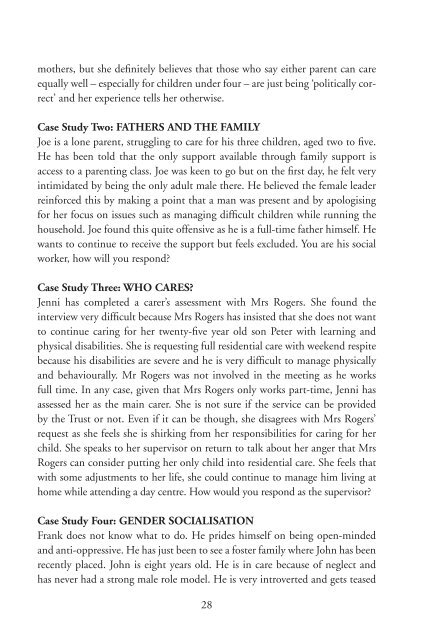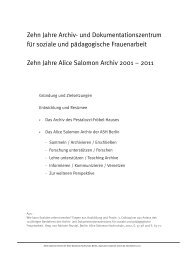Teaching Gender in Social Work - MailChimp
Teaching Gender in Social Work - MailChimp
Teaching Gender in Social Work - MailChimp
You also want an ePaper? Increase the reach of your titles
YUMPU automatically turns print PDFs into web optimized ePapers that Google loves.
mothers, but she def<strong>in</strong>itely believes that those who say either parent can care<br />
equally well – especially for children under four – are just be<strong>in</strong>g ‘politically correct’<br />
and her experience tells her otherwise.<br />
Case Study Two: FATHERS AND THE FAMILY<br />
Joe is a lone parent, struggl<strong>in</strong>g to care for his three children, aged two to five.<br />
He has been told that the only support available through family support is<br />
access to a parent<strong>in</strong>g class. Joe was keen to go but on the first day, he felt very<br />
<strong>in</strong>timidated by be<strong>in</strong>g the only adult male there. He believed the female leader<br />
re<strong>in</strong>forced this by mak<strong>in</strong>g a po<strong>in</strong>t that a man was present and by apologis<strong>in</strong>g<br />
for her focus on issues such as manag<strong>in</strong>g difficult children while runn<strong>in</strong>g the<br />
household. Joe found this quite offensive as he is a full-time father himself. He<br />
wants to cont<strong>in</strong>ue to receive the support but feels excluded. You are his social<br />
worker, how will you respond?<br />
Case Study Three: WHO CARES?<br />
Jenni has completed a carer’s assessment with Mrs Rogers. She found the<br />
<strong>in</strong>terview very difficult because Mrs Rogers has <strong>in</strong>sisted that she does not want<br />
to cont<strong>in</strong>ue car<strong>in</strong>g for her twenty-five year old son Peter with learn<strong>in</strong>g and<br />
physical disabilities. She is request<strong>in</strong>g full residential care with weekend respite<br />
because his disabilities are severe and he is very difficult to manage physically<br />
and behaviourally. Mr Rogers was not <strong>in</strong>volved <strong>in</strong> the meet<strong>in</strong>g as he works<br />
full time. In any case, given that Mrs Rogers only works part-time, Jenni has<br />
assessed her as the ma<strong>in</strong> carer. She is not sure if the service can be provided<br />
by the Trust or not. Even if it can be though, she disagrees with Mrs Rogers’<br />
request as she feels she is shirk<strong>in</strong>g from her responsibilities for car<strong>in</strong>g for her<br />
child. She speaks to her supervisor on return to talk about her anger that Mrs<br />
Rogers can consider putt<strong>in</strong>g her only child <strong>in</strong>to residential care. She feels that<br />
with some adjustments to her life, she could cont<strong>in</strong>ue to manage him liv<strong>in</strong>g at<br />
home while attend<strong>in</strong>g a day centre. How would you respond as the supervisor?<br />
Case Study Four: GENDER SOCIALISATION<br />
Frank does not know what to do. He prides himself on be<strong>in</strong>g open-m<strong>in</strong>ded<br />
and anti-oppressive. He has just been to see a foster family where John has been<br />
recently placed. John is eight years old. He is <strong>in</strong> care because of neglect and<br />
has never had a strong male role model. He is very <strong>in</strong>troverted and gets teased<br />
28














